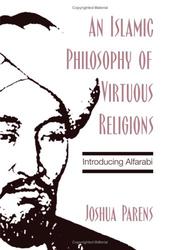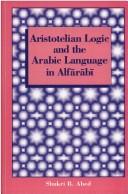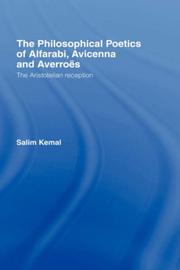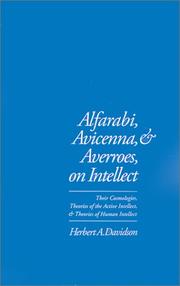| Listing 1 - 5 of 5 |
Sort by
|
Book
ISSN: 01698729 ISBN: 9789004206151 9004206159 9786613530509 9004217320 1280126647 9789004217324 9781280126642 Year: 2012 Volume: 85 Publisher: Leiden
Abstract | Keywords | Export | Availability | Bookmark
 Loading...
Loading...Choose an application
- Reference Manager
- EndNote
- RefWorks (Direct export to RefWorks)
This study—the first monograph devoted exclusively to al-Fārābī’s cosmology—provides a new interpretation of this thinker’s philosophical development through an analysis of the Greek and Arabic sources and a contextualization of his life and thought in the cultural and intellectual milieu of his time. It discusses key cosmological and metaphysical concepts articulated in his works, with a special focus on celestial causation, intellection, and motion. This book also examines al-Fārābī’s cosmological method and particularly the connection between astronomy, physics, and metaphysics. The result is a reassessment of al-Fārābī’s cosmology vis-à-vis late-antique Greek philosophical trends and a clearer understanding of how it creatively adapted and transformed this legacy to establish a new cosmological paradigm in Arabic thought.
Islamic cosmology --- Cosmology, Islamic --- Muslim cosmology --- Cosmology --- al-Fārābī, Abū-Nasr Muhammad. --- Abū Nasr Muhammed ibn Muhammed ibn Tarhān ibn Uzlag al-Farabi --- Alfarabius --- Alpharabius --- Fārābī --- Muhammed Ibn Muhammed (Abu Nasir) al-Farabi --- Islamic cosmology. --- Fārābī.

ISBN: 079148212X 1429411775 9781429411776 0791466892 9780791466896 9780791482124 Year: 2006 Publisher: Albany State University of New York Press
Abstract | Keywords | Export | Availability | Bookmark
 Loading...
Loading...Choose an application
- Reference Manager
- EndNote
- RefWorks (Direct export to RefWorks)
Joshua Parens provides an introduction to the thought of Alfarabi, a tenth-century Muslim political philosopher whose writings are particularly relevant today. Parens focuses on Alfarabi's Attainment of Happiness, in which he envisions the kind of government and religion needed to fulfill Islam's ambition of universal acceptance. Parens argues that Alfarabi seeks to temper the hopes of Muslims and other believers that one homogeneous religion might befit the entire world and counsels acceptance of the possibility of a multiplicity of virtuous religions. Much of Alfarabi's approach is built upon Plato's Republic, which Parens also examines in order to provide the necessary background for a proper understanding of Alfarabi's thought.
Islamic philosophy. --- Arabic philosophy --- Muslim philosophy --- Philosophy, Islamic --- Philosophy, Arab --- Fārābī. --- Abū Nasr Muhammed ibn Muhammed ibn Tarhān ibn Uzlag al-Farabi --- Alfarabius --- Alpharabius --- Fārābī --- Muhammed Ibn Muhammed (Abu Nasir) al-Farabi --- Islamic philosophy --- al-Fārābī, Abū-Nasr Muhammad. --- Farabi.

ISBN: 0585078238 0585078238 9780585078236 0791403971 079140398X 0791494098 9780791403976 9780791494097 Year: 1991 Publisher: Albany, N.Y. State University of New York Press
Abstract | Keywords | Export | Availability | Bookmark
 Loading...
Loading...Choose an application
- Reference Manager
- EndNote
- RefWorks (Direct export to RefWorks)
Logic --- Language and logic. --- Linguistics and logic --- Logic in language --- Language and languages --- Semantics --- Argumentation --- Deduction (Logic) --- Deductive logic --- Dialectic (Logic) --- Logic, Deductive --- Intellect --- Philosophy --- Psychology --- Science --- Reasoning --- Thought and thinking --- Terminology --- History. --- Methodology --- Fārābī --- Aristotle --- Aristoteles --- Aristote --- Arisṭāṭṭil --- Aristo, --- Aristotel --- Aristotele --- Aristóteles, --- Aristòtil --- Aristotile --- Arisṭū --- Arisṭūṭālīs --- Arisutoteresu --- Arystoteles --- Ya-li-shih-to-te --- Ya-li-ssu-to-te --- Yalishiduode --- Yalisiduode --- Ἀριστοτέλης --- Αριστοτέλης --- Аристотел --- ארסטו --- אריםטו --- אריסטו --- אריסטוטלס --- אריסטוטלוס --- אריסטוטליס --- أرسطاطاليس --- أرسططاليس --- أرسطو --- أرسطوطالس --- أرسطوطاليس --- ابن رشد --- اريسطو --- Pseudo Aristotele --- Pseudo-Aristotle --- アリストテレス --- Abū Nasr Muhammed ibn Muhammed ibn Tarhān ibn Uzlag al-Farabi --- Alfarabius --- Alpharabius --- Fārābī --- Muhammed Ibn Muhammed (Abu Nasir) al-Farabi --- Language. --- Contributions in logic. --- Logic - Terminology - History.

ISBN: 0700713484 9781136121227 1136121226 128388383X 9781283883832 9780203037195 0203037197 9780700713486 9781136121302 9781136121388 9780415616454 1136121307 Year: 2003 Publisher: London RoutledgeCurzon
Abstract | Keywords | Export | Availability | Bookmark
 Loading...
Loading...Choose an application
- Reference Manager
- EndNote
- RefWorks (Direct export to RefWorks)
This book examines the studies of Aristotle's Poetics and its related texts in which three Medieval philosophers - Alfarabi, Avicenna and Averroes - proposed a conception of poetic validity (beauty), and a just relation between subjects in a community (goodness). The work considers the relation of the Poetics to other Aristotelian texts, the transmission of these works to the commentators' context, and the motivations driving the commentators' reception of the texts. The book focuses on issues central to the classical relation of beauty to truth and goodness.
Aesthetics. --- Beautiful, The --- Beauty --- Esthetics --- Taste (Aesthetics) --- Philosophy --- Art --- Criticism --- Literature --- Proportion --- Symmetry --- Psychology --- Fārābī. --- Avicenna, --- Averroës, --- Aristotle. --- Aristoteles. --- Ἀριστοτέλης. --- Abū al-Walīd ibn Rushd, --- Abū al-Walīd Muḥammad ibn Aḥmad ibn Rushd, --- Abū el-Walīd ibn Roshd, --- Abuʼl-Walid Muhammad bin Rusjd, --- Alṿalid ibn Rushd, --- Averroè, --- Averróis, --- Bin Rusjd, Muhammad bin Ahmad, --- Ibn-e-Rushd, --- Ibn-i Rushd, --- Ibn Rashad, --- Ibn Rochd, --- Ibn Roshd, Abū el-Walīd, --- Ibn Roshd, --- Ibn Ruschd, --- Ibn Rušd, --- Ibn Rushd, --- Ibn Rushd al-Ḥafīd, --- Ibn Rushd, Abū al-Walīd, --- Ibn Rushd, Abū al-Walīd Muḥammad ibn Aḥmad, --- Ibn Rushd, Abul Walid Muhammad ibn Ahmad, --- Ibnu Rosjid, --- Ibnu Rusjd, --- ابن رشد، --- Muḥammad ibn Aḥmad ibn Rushd, --- Al-Hosain ben Abdallah ben Sînâ, Abou Alî --- Avicenna Latinus --- Avicenne --- Avicene --- Ibn Sīnā, al-Husayn ibn 'Abd Allāh --- Al-Hoessein Ibn Abdoellah Ibn Sînâ, Abou Alî --- Abū Nasr Muhammed ibn Muhammed ibn Tarhān ibn Uzlag al-Farabi --- Alfarabius --- Alpharabius --- Fārābī --- Muhammed Ibn Muhammed (Abu Nasir) al-Farabi --- Radio broadcasting Aesthetics --- Aesthetics

ISBN: 1280526114 019536077X 142940115X 9781429401159 9780195074239 0195074238 9781280526114 0195074238 9786610526116 6610526117 0197729940 Year: 1992 Publisher: New York : Oxford University Press,
Abstract | Keywords | Export | Availability | Bookmark
 Loading...
Loading...Choose an application
- Reference Manager
- EndNote
- RefWorks (Direct export to RefWorks)
Medieval Islamic, Jewish and Christian philosophers of the 16th century considered the distinction between the potential and the active intellect as a key to deciphering the nature of man and the universe. This study examines the manner in which three specific philosophers dealt with the issue.
Islamic philosophy --- Intellect. --- Philosophy of mind. --- Islamic cosmology. --- Cosmology, Islamic --- Muslim cosmology --- Cosmology --- Mind, Philosophy of --- Mind, Theory of --- Theory of mind --- Philosophy --- Cognitive science --- Metaphysics --- Philosophical anthropology --- Human intelligence --- Intelligence --- Mind --- Ability --- Psychology --- Thought and thinking --- Greek influences. --- Fārābī. --- Avicenna, --- Averroës, --- Abū al-Walīd ibn Rushd, --- Abū al-Walīd Muḥammad ibn Aḥmad ibn Rushd, --- Abū el-Walīd ibn Roshd, --- Abuʼl-Walid Muhammad bin Rusjd, --- Alṿalid ibn Rushd, --- Averroè, --- Averróis, --- Bin Rusjd, Muhammad bin Ahmad, --- Ibn-e-Rushd, --- Ibn-i Rushd, --- Ibn Rashad, --- Ibn Rochd, --- Ibn Roshd, Abū el-Walīd, --- Ibn Roshd, --- Ibn Ruschd, --- Ibn Rušd, --- Ibn Rushd, --- Ibn Rushd al-Ḥafīd, --- Ibn Rushd, Abū al-Walīd, --- Ibn Rushd, Abū al-Walīd Muḥammad ibn Aḥmad, --- Ibn Rushd, Abul Walid Muhammad ibn Ahmad, --- Ibnu Rosjid, --- Ibnu Rusjd, --- ابن رشد، --- Muḥammad ibn Aḥmad ibn Rushd, --- Al-Hosain ben Abdallah ben Sînâ, Abou Alî --- Avicenna Latinus --- Avicenne --- Avicene --- Ibn Sīnā, al-Husayn ibn 'Abd Allāh --- Al-Hoessein Ibn Abdoellah Ibn Sînâ, Abou Alî --- Abū Nasr Muhammed ibn Muhammed ibn Tarhān ibn Uzlag al-Farabi --- Alfarabius --- Alpharabius --- Fārābī --- Muhammed Ibn Muhammed (Abu Nasir) al-Farabi --- Philosophie --- Xe-XIIe s., 901-1200 --- Philosophie arabe --- Philosophie grecque --- Islamic philosophy - Greek influences --- Intellect --- Islamic cosmology --- Avicenna, - 980-1037 --- Averroës, - 1126-1198 --- Averroès, 1126-1198 --- Avicenne, 980-1037 --- Philosophy, Islamic --- Averro�es, --- F�ar�ab�i. --- Farabi. --- Averroes,
| Listing 1 - 5 of 5 |
Sort by
|

 Search
Search Feedback
Feedback About UniCat
About UniCat  Help
Help News
News